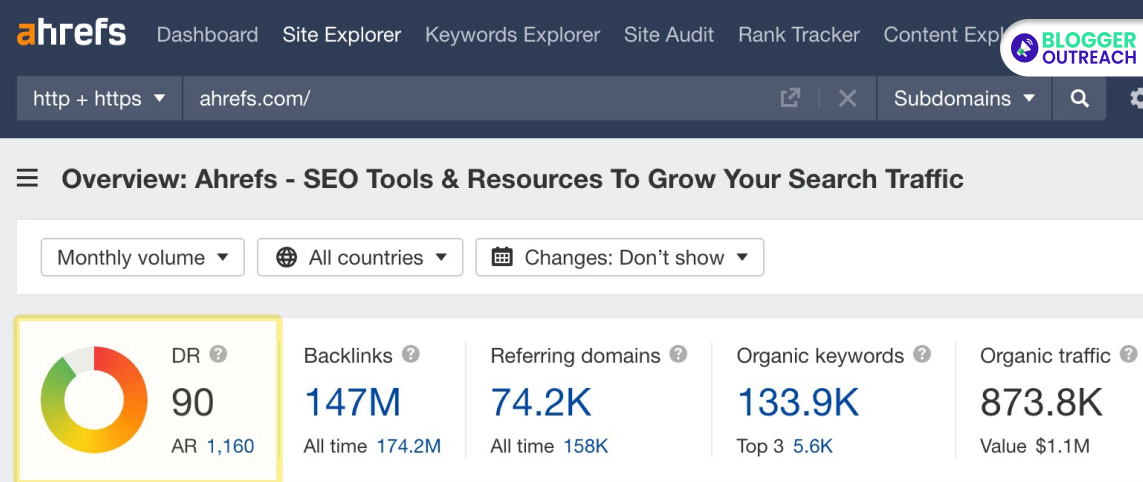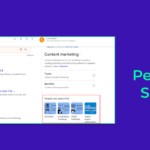Table Of Content
- 1 Understanding Domain Authority (DA)
- 2 Introduction To Domain Rating (DR)
- 3 Understanding The DA vs DR Comparisons
- 4 Google’s Thoughts On Domain Authority
- 5 DA vs DR – Why It Matters And Why It Does Not
- 6 Bonus Insight: Ahref’s DR And Linked Domains
- 7 DA vs DR – The Importance Of Considering Other Metrics
- 8 Finding High-Quality Websites For Link Building
- 9 DA vs DR – The Fluctuation Of Scores
- 10 Looking Beyond DA And DR – See The Bigger Picture!
- 11 DA vs DR – The True Role Of 3rd Party Authority Scores
When it comes to link building, two key metrics are often used to evaluate the quality of websites: Domain Authority (DA) and Domain Rating (DR).
Whether they are a direct ranking factor or not is a point of discussion (discussed inside)…
…BUT the fact is that almost every SEO checks these two metrics before linking to your site.
How should we treat them?
For effective link building campaigns, it is important to understand the differences and limitations of these metrics. However, there are a lot of misconceptions related to DA and DR.
In this article, we will address this DA vs DR misconception and let you understand what actually matters.
Table Of Content👇
- What is DA?
- Understanding DR.
- Getting into DA vs DR.
- DA vs DR – When it’s important and when it is not.
- Bonus Insight: Ahref’s DR and Linked Domains.
- The importance of considering other metrics as well.
- Identifying high-quality websites for link building.
- Looking beyond DA and DR – The Bigger Picture!
Understanding Domain Authority (DA)

Domain Authority (DA) is a metric developed by Moz, one of the leading SEO tools. It measures the strength and authority of a domain based on various factors, including the number and quality of backlinks pointing to the website.
On a logarithmic scale, DA scores range from 1 to 100, with higher scores meaning more authority.
It’s important to consider several key factors when increasing DA.
First, the age of the domain plays a role, as older domains tend to have higher authority. Second, the quality of backlinks is crucial. Acquiring backlinks from high-authority websites can significantly improve a website’s DA score.
Additionally, ensuring that the website is mobile-friendly, has a strong social media presence, and offers high-quality content can also contribute to a higher DA score.
While DA can be a useful metric for evaluating a website’s authority, it’s important to note that it is not a direct ranking factor used by Google. Instead, Moz developed this tool to help SEO professionals evaluate a website’s authority and make informed link building decisions.
Introduction To Domain Rating (DR)

Domain Rating (DR) is a metric developed by Ahrefs, another popular SEO tool. DR measures the strength of a website’s backlink profile.
Basically taking into account factors such as the number of do-follow links, the DR of linking websites, and the overall backlink profile. Similar to DA, DR is calculated on a scale of 1 to 100, with higher scores indicating a stronger backlink profile.
Likewise, to improve a website’s DR, focusing on the quality and quantity of backlinks is crucial. Acquiring backlinks from websites with high DR scores can positively impact a website’s own DR.
Additionally, increasing the number of websites linking to the main website and optimizing the internal linking structure can also contribute to a higher DR score.
Unlike DA, DR is often considered a more accurate and reliable metric for assessing the strength of a website’s backlink profile. It aligns well with Google’s ranking algorithm, making it a valuable metric for link building campaigns.
Understanding The DA vs DR Comparisons
While both DA and DR are valuable metrics for evaluating websites, it’s essential to understand their limitations and differences. Here are some key points to consider:
- Authority vs. Backlink Profile: DA measures the overall authority of a domain, taking into account various factors beyond backlinks. On the other hand, DR focuses specifically on the strength and quality of a website’s backlink profile.
- Calculation: Moz calculates DA based on over 170 factors, while Ahrefs calculates DR based on factors such as the number of do-follow links, DR of linking websites, and overall backlink profile.
- Manipulation: Both metrics can be manipulated to some extent. However, DA is often considered more susceptible to manipulation, as it can be influenced by factors such as redirecting old sites or acquiring backlinks from low-quality websites. DR, on the other hand, is generally more difficult to manipulate due to its focus on the quality of a website’s backlink profile.
- Ranking Factors: It’s important to note that neither DA nor DR are direct ranking factors used by Google. When determining search rankings, Google takes into account numerous factors, not just DA or DR. There are third party metrics; so Google has nothing to do with Da and DR.
Google’s Thoughts On Domain Authority
According to Search engine trend analyst John Muller, Google doesn’t use domain authority as a ranking metric.
When asked about DA improvement strategies, John Muller has clarified this on a Reddit discussion:
“I’m kinda torn. On the one hand, you do not need DA for Google Search. Google doesn’t use it *at all*. If you’d like to level your site up in search, you’d need to focus on something else, or at least use other metrics for it. This is mostly why DA as a metric is frowned upon by many SEOs. For context, I don’t think I’ve ever looked up the DA for a site in the 14 years I’ve been doing this.”
DA vs DR – Why It Matters And Why It Does Not
DR and DA are both fervent and nuanced topics of discussion in the SEO field. These metrics aren’t direct ranking factors, but they are crucial to building online authority and securing quality links.
(i) Building Clout With DR And DA
These metrics, often interchangeable with Authority Score, hold intrinsic value. Clients, novices, and seasoned SEO professionals alike frequently glance at DA when evaluating a site.
Though it’s not a Google metric, having a decent DA reflects positively on your brand. Despite the debate, it’s a necessary consideration in the eyes of many, influencing perceptions about a site’s credibility.
(ii) Getting Valuable Links
DR and DA play a pivotal role in link building. Sites with higher authority scores are more likely to attract links, whether through legitimately earned links or, regrettably, via less orthodox tactics.
When reaching out for link building, a respectable DA can be the key to engaging with larger, more influential sites. It acts as a sort of virtual handshake, making it more likely for others to collaborate with you.
Bonus Insight: Ahref’s DR And Linked Domains
A noteworthy insight lies in Ahref’s DR and its correlation with the number of linked domains from the linking site. High DR sites linking to fewer domains are considered more impactful. This nuance clarifies why link farms may not be as effective in boosting your DR.
An unconventional strategy involves seeking sites with high DRs and minimal outgoing links or exploring website theme portfolio pages for their often overlooked link-boosting potential.
DA vs DR – The Importance Of Considering Other Metrics
When assessing a website’s quality and authority, it is important to consider a wide range of metrics and rating factors. If you focus solely on DA or DR, you may overlook important aspects of a website’s performance.
Other metrics and factors to consider include organic traffic, spam score, trust flow, anchor text ratios, and the relevance of the website’s topics and categories. Analyzing these additional metrics can provide a more comprehensive and accurate overview of a website’s value and authority.
Finding High-Quality Websites For Link Building
When it comes to link building, it’s crucial to target high-quality websites that align with your niche and industry. While DA and DR can be useful starting points, other factors should be considered to ensure the websites you target are suitable for your link-building campaign. Here are some key factors to consider:
(i) Design
Good websites for link building often have a well-designed and visually appealing layout. They invest effort into custom elements, quality logos, and unique images. Avoid websites that use basic blog templates or stock images, as they may indicate low-quality or spammy websites.
(ii) Content
High-quality websites publish well-written and valuable content that is relevant to their niche or industry. Avoid websites that have thin or poorly written articles, as these may be low-quality guest posts used solely for backlinks. Look for websites that provide original, well-written content that complements their overall theme and design.
(iii) Outgoing Links
Pay attention to the outgoing links of a website. Good websites typically link to other high-quality and relevant resources, adding value to their content. Avoid websites that have unnatural or spammy outgoing links that do not contribute to the overall quality of the content.
(iv) Topics And Categories
Consider the topics and categories covered by a website. Avoid websites that publish random and unrelated content across various categories. Look for websites that have a clear content creation strategy and focus on specific themes or topics. Each piece of content should have a target audience in mind and be written to appeal to them.
(v) Company Information
Check the company information provided by the website. Good websites usually have an About Us page with detailed information about the website’s owners and contributors. They also provide contact information, including active links to social accounts. Avoid websites that lack company information or provide vague details about the website’s ownership.
You can identify high-quality websites for your link-building campaign by combining these factors with metrics like DA and DR.
DA vs DR – The Fluctuation Of Scores
It’s important to note that DA and DR scores can fluctuate significantly across different SEO tools. While these metrics are intended to measure a website’s authority and backlink profile, the scoring systems can vary between different software platforms. This can sometimes lead to discrepancies and confusion when comparing scores from different tools.
For example, a website may have a high DA score according to Moz but a lower DR score according to Ahrefs. These discrepancies highlight the need to consider a wide range of metrics and rating factors when assessing the quality and authority of a website. Relying solely on DA or DR scores can overlook important aspects of a website’s overall performance.
Looking Beyond DA And DR – See The Bigger Picture!
We recommend building an audience before thinking about anything. You will attract natural links when you have an audience with you. So, how can you proceed with the same?
- Pick a topic that you know about or can learn about, and find a topic that has low competition. Figure out where you can stand out easily.
- Create a reasonable collection of fantastic content, not a mass of content.
- Initially, treat search engines as if they didn’t exist, and assume you won’t get any traffic from them.
- Make sure your audience knows about your content – find them, reach out to them, if necessary, advertise to them.
- Build your audience first so that search engines know your content is great.
- You shouldn’t just publish because you can. Instead, create content that is unique, compelling, and high-quality.
- If you keep your audience returning, and they recommend your site, search engines will pick it up. Eventually, DA and DR will improve.
A long-term approach takes time, and you have to bring your content to your audience first, they won’t just find you.
On the other hand, a short-term hack might move some metrics, but it won’t last, and you’ll be back here soon enough.
DA vs DR – The True Role Of 3rd Party Authority Scores
In essence, DR and DA matter not as direct ranking factors but as tools for building an online reputation. In fact, they facilitate effective link-building campaigns.
Despite their importance, they should be viewed realistically.
Check these metrics for link prospecting. So, spending a lot of time may not be prudent.
Your effective link building campaign will be guided by them. Relying on them solely is not a good idea.
Read Also:








